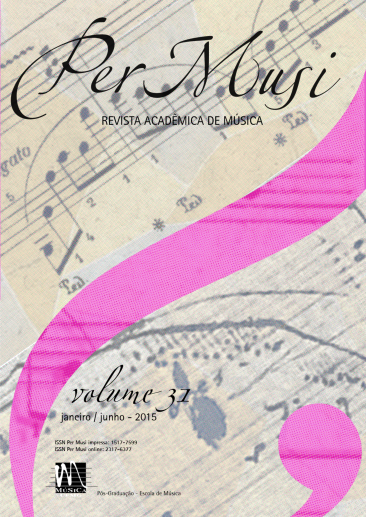Musical learning in maturity
dialogue between theory and practice
Keywords:
Musical learning for adults, Older beginners in music, Musical meaning and learning experience, Music theory and practiceAbstract
This work presents a partial synthesis of the master’s research concluded in 2010, and aims at discussing the meaning of musical learning and its relation to theory and practice, taking into account the intention and musical ability of mature adults. Under this qualitative approach with techniques of educational ethnography, the paper brings the reports of eight students over 50 years old who participated of semi-structured interviews during the community course Appraising and Musicalization in Maturity – UFMG. The results derive from the interpretative analysis of content, based on the ideas of SWANWICK (2003; 1996) and GREEN (2005). The final considerations consider the importance of adapting methods of musical learning for this age range, combining basic theory and practical activities in accordance to the possibilities and experience of the learner.
References
ANDRÉ, M. E. D. A. Etnografia da prática escolar. 13. ed. Campinas: Papirus, 2007.
CIRINO, A. C. Apreciação musical: um processo ativo na musicalização de adultos. In: CONGRESSO DA ASSOCIAÇÃO NACIONAL DE PESQUISA E PÓS-GRADUAÇÃO EM MÚSICA, 21., 2011, Uberlândia. Anais... Uberlândia: ANPPOM, 2011. p.296-302.
DEBERT, G. G. A reinvenção da velhice. São Paulo: Edusp, 2004.
DENORA, T. Music sociology: getting the music into the action. British Journal of Music Education, Cambridge, v.20, n.2, p.165-177, 2003.
FONTERRADA, M. T. O. Diálogo interáreas: o papel da educação musical na atualidade. Revista da ABEM, Porto Alegre, v.18, p.27-33, out. 2007.
GAINZA, Violeta H. Estudos de psicopedagogia musical. Tradução Beatriz A. Cannabrava. São Paulo: Summus, 1988.
GREEN, Lucy. Meaning, autonomy and authenticity in the music classroom. Londres: Institute of Education, University of London, 2005.
ILARI, B. A música e o cérebro: algumas implicações do neurodesenvolvimento para a educação musical. Revista da ABEM, Porto alegre, v.9, p.7-16, set. 2003.
KHALSA, D. S. Longevidade do cérebro. Tradução Sylvia Bello. Rio de Janeiro: Objetiva, 2005.
LUZ, M. C. Educação musical na maturidade. São Paulo: Editora Som, 2008.
NERI, A. L.; CACHIONI, M. Velhice bem-sucedida e educação. In: NERI, A. L.; DEBERT, G. G. (Orgs.). Velhice e sociedade. Campinas: Papirus, 2004. p.113-140.
PARENTE, M. A. M. P. Cognição e envelhecimento. São Paulo: Artmed, 2006.
PENNA, M. Reavaliações e buscas em musicalização. São Paulo: Loyola, 1990.
RUUD, E. Music Therapy: improvisation, communication and culture. Barcelona: Publishoes, 1998.
SEKEFF, M. L. Da música: seus usos e recursos. São Paulo: UNESP, 2002.
SLOBODA, J. A mente musical: a psicologia cognitiva da música. Tradução Beatriz Ilari e Rodolfo Ilari. Londrina: EDUEL, 2008.
SOUZA, J. Sobre as múltiplas formas de ler e escrever música. In: NEVES, I.; SOUZA, J.; SCHAFFER, N. et al. (Orgs.). Ler e escrever: compromisso de todas as áreas. Porto Alegre: Editora da UFRGS, 1998. p.205-214.
SWANWICK, K. Ensinando música musicalmente. São Paulo: Moderna, 2003.
_______. Music education before the National Curriculum. In: SPRUCE, Gary (Ed.). Teaching music. Londres: Routledge, 1996. p.21-48
SZYMANSKI, H.; ALMEIDA, L. R.; PRANDINI, R. C. A. R. A entrevista na pesquisa em educação: a prática reflexiva. 2. ed. Brasília: Editora Plano, 2008.
Downloads
Published
Issue
Section
License
Copyright (c) 2015 Per Musi

This work is licensed under a Creative Commons Attribution 4.0 International License.

Except where otherwise noted, contents on this site are licensed under a Creative Commons - Atribuição 4.0 Internacional.


